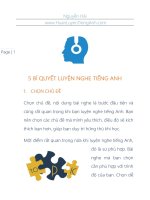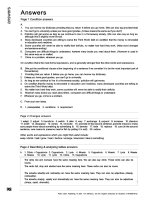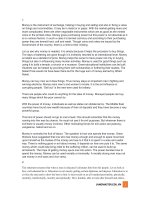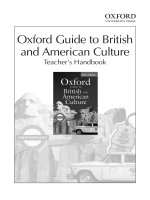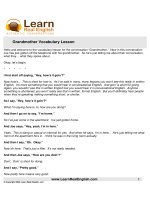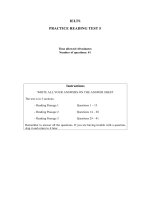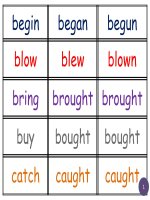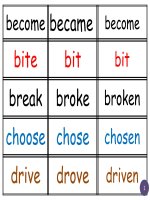Outcomes elementary SB kho tài liệu học tiếng anh
Bạn đang xem bản rút gọn của tài liệu. Xem và tải ngay bản đầy đủ của tài liệu tại đây (40.46 MB, 186 trang )
Hello
Family and age
Ordering in a caf6
Questions
Personal information
Me too
introduce yourself
say where you are from and what you do
ask common questions
describe your hometown
what people like
arrange to meet
ask
talk about your free time
ask about common daily activities
talk about the area you live in
name things you often buy and do
explain where things are
explain what you need to do
talk about what you did
pronounce past forms
express your feelings about what people tell you
talk about dates and months
point and describe what you want
talk to a shop assistant
say numbers better
talk about things happening now
name school and university subjects
talk about studying at university
explain your feelings about courses
talk aboutyour school system
talk about your family
express surprise
give opinions about family life
explain things that are (not) necessary
talk about people's plans
make suggestions
talk about things you want to do
talk about government plans
.l
.a
It
HEINLE
CENGAGE Learning
Outcomes Elementary Student's Book
O 2011 Heinle, Cengage Learning EMEA
Hugh Dellar and Andrew Walkley
ALL RIGHTS RESERVED. No part of this work covered by the
copyright herein may be reproduced, transmitted, stored or used
in any form or by any means graphic, electronic, or mechanical,
including but not limited to photocopying, recordlng, scanning,
digitizing, taping, Web distribution, information networks, or
information storage and retrieval systems, except as permitted
under Section 107 or 108 ofthe 1976 United States Copyright Act,
or applicable copyright law of another jurisdiction, without the
prior written permission of the publisher.
Publisher: .lason Mann
Senior Commissioning Editor: John Waterman
Development Editor: Sue FJones
Senior Marketing Manager: Ruth McAleavey
Content Project Editor: Amy Smith
Manufacturing Team Lead: Paul Herbert
Cover and text designer: Studio April
For permission to use material from this text or product, submit all
Compositor: Studio April
requests online at cengage.com/permissions.
Further permissions questions can be emailed to
permissionrequ€
ISBN: 978-1-111-07129-5
Heinle, Cengage Learning EMEA
Cheriton House, North Way, Andover, Hampshire
SPlO 58E United Kingdom
Cengage Learning is a leading provider of customised learning
solutions with office locations around the globe, including
Singapore, the United Kingdom, Australia, Mexico, Brazil and Japan.
Locate our local office at international.cengage.com/region
Cengage Learning products are represented in Canada by Nelson
Education Ltd.
Pnnted in China
l -: J5 6-E9 l0-
15 1,1 13 12
ll
Visit Heinle online at elt.heinle.com
Visit our corporate website at cengage.com
How to use MyELT and access the MyOutcomes Online activities
to myelt.heinle.com
't
Go
2
5tudents
(:-.
'_!3ur u5ername and password.
Teachers
: .st of ali,you need to applyfor an'lnstructorAccount'.This allowsyou to access a Course and
gererate a'Course-Key'foryour students to enrol on the course. Co to:
Ciick on Create an Account
Select "lnstructor"
Scroii down to the middle of the next page and click'Request an lnstructor Account'
Completethe shortform - in the Product lnformation field enterthetitlesyou would like an account
for in the'Other' section
Clrck Submit.
myMonline
Pee! Iabel to see pin code
STUDENT,S BOOK
H
UCH DELLAR
AND
ANDREW WALKLEY
ETEMENTARY
TCO
,'*
'l-
HEINLE
CENGAGE Learning"
ES
Clear communicative
PEOPLE
goals in the unit menu,
supported by grammar
AND
PLACES
and vocabulary.
Listening exercises
give examples of the
Sprl*rle .,.....A ',1.1 !h.to, Ltd.ntoth.
conv.lrat,on.fr.nrcpe.t tt h prbs.
a ilndcnt h.s M inklvi.w
Co nve
rsati o n
p ra
rt.h lnBiirhfanEuageschool
y' the 3enten .r th.t.re true,
A ,,1,2 !den.Ii4
I rhe (udenti nanre ! M'8uel
2 H,s fJmilyname 6 aernando
I Hes tom spa'n
! Be ver n Ch huahua
5 (hrhuahua 5 n the easl
conversations you try in
cti ce.
B &t.n.8&
Crammar taught in
context, with natural
examples and clear
practice tasks.
')
ud 6r.4
th.3.nt.re.
h d.r.Iie
A
Uat
crlr,rr,rin,r,",",oa"
A Wnt.m.Ulormr.
ltua
Youie
He3
SheS
Thrtr
B Hae. 3ih!d cotrv.lr.tloE db
h you .1d3. Ure your nam6.
C
sdme
wothp&,1rytofy6.,1e8of
e.ryo&hFutu5.lor.l5pl.:
rt
E
B Cohph. U. .onv.r$tun dU h. cdGt rhon foh3
I
H' Comi i. 5 t down My.a,he
Whrt ...'you, namel
I
Rrght Hi N'.e tomeetyou
D
Mn h lntlishhonetudel
B
Fhdoutwhirokp.ophhFu.la!&.&iMatdo
C
M.tdthejotrl-Bto6epl&Bp6plewotka-h,
O :'r--'^
[#{\,.=
voca bula ry.
lnteresting listening and
read i ng
texts. Very va ried
h
'your surname
Y.ursur.ame Yourfam y name
VocABUtaRY iobs
Pictures to help with new
Andwh;t
of
,a teJ.her here
M Oh.scrrytr rHernrnde? That ;H t-R-N A N D-t-Z
I OK And where '/ou ftom M gue I 5pa ni
.not.l
,nomMexco
M No
r: Oh OK Wh.h pad,
M Ch,huah!a lt irrnth€nodh
3trt
A How@y job cdyou
I W
dba
,,"r,n"'^
place h bBgct / mor
h p&. ffid
hpotut
h a-t h ererc8e Cr
Work
I Wor] h pah,
Bave
thr.e conversatiort
A: Oh,yes)Where doyou workl
6 h r.afe n town What doyo! dol
g lheredoyo! @*)
A n3studo nBer n
trsrinrni
A ,,1.5 Lrtentofou.onv€roam*(
rf\
S.corre.twods.
/ha\pilol
I )an sad4lat/nutse
^n(l1ntt
!?llrrll:
\:-r
/-q\
A
g#
fi>t
.a-
translation exercise
helpsyou think about
how sentences work
in your own language
compared to English.
{re
ffi
A
t,:)
n r (btner shop / rn! depaftmenl store
ina.ri.'. /rn; hospta
in a lar off.e / n. lo.rl Sover.ment ofr.e
n a bLg hotel / in a small(ompany
inr (hool / in: un^t6ity
rta loGl po ceilat o. / inihetratr. deprdmenl
inacafa/.are+J!,ant
) lata is. dltgnet / tea.het tn o {hool / at
enjoy\ / dc6n t enjo!
alJia ir qr\ta
I Mrda E r.,v,Jerrrrtlr..eptorrt
'ne
she
watkt 6 on oltcc / a .onplny in tne nor
ol Atatl ret )ab\s gtear / AK
4 Fil ppa s a woilet / shap us\thnt \n r
depdnmenl nate / cofi ir\he intte
oftow. HEdoe9.'1 lL n H€wrnB lo
becohe z Poke aft{ / n06e
B Rerdth. uabftdlt
otrpr8e 170.trd Urt
.,1: ,
.
htiffihForLnrq!
hli. rho hft ttu ttdld!!.!!p"
r*&Ebbltddliqd
u4'zt&p #d e:6)'
WEdproukd.bgd
EEdrh!@G.iMa
lsqtrlbsodi^Eli.. :$iqd b'ii a d€csG
'
Lots ofexpressions and
coNvERsarroNs
DEvEt oPtNG
grammatical patterns in
spoken English are similar
to other languages. These
exercises help you notice
them.
lirt.n ag&
ild
r..d thc Ndloolpl
on pag.
,0
to
E4
h pds, p!.&e te.&A th. .otrEirrdm
ilAIWE SPEAIGN EilCIISH
weoten rayrurnda.
Lntlerd ol
l.nily non.
lnformation on
interesting language
:L.
N h at \ yaut tuthade, Mtguet I
nohe\ Lno and ny tuhone 5 Sjukl
^t
46 \utndn.\
Lontbury
My fi
common to native
speakers of English.
VocABULARY aouniriPs
wo* h
mro,n
......
'.thrncdh
iheyie noa . . .. . ........
thc 5oulh
'n
m iom
rn lheeart
Mymlmlfrom
nthewgi
inthemddle
Mydadsfrom
2
I
j
t
6
p&. M.th S..ouu6 io&. @ dfte
B
Bave
corver*toB-
Use
@u6.etuo^ Vdabd.ry,
For ctuPl.:
oi citi.6 / d€as h you .outy.
A nlton
Atgehtina
Pron u nciation
activities
integrated with the
communicative goals.
C Moteho-tnthesouth.
C
mq. de youpertr/ gdFaBtunl
pSq.
IeU.
coNvERsATtoN PRAcflcE
Southh.rka
. A.d
:
!.n
dd
6ay the
The Conversation practice
where !re youfroml
.outried,
section allows you to put
together what you learn.
iaDING
GRAMMAR
...i Mor" grammar and
i vocabulary points
Present simple
-a 5. Ute€ t.ie. D.ctd. who b
roofis.fuiua&/A
do+r/p/ftltryrsdl
&+&/*rt+E.bt
i
embili.tlqdfua/ffi
l/p/rclrh.,+tut+6b
k/il/tlet+ralt
I wo* il ho.leand ldolobriot
differ.nt (onpr.Lei rnd ma8au rn6
rdof,\ Bet mu.h moneyk.!!r
don't haw mlchwod,bu lanloyn
€
A Conll.iefrcEentmcesddq
1 A what
d@t,dor'tot
ycudo?
.....
.a?.4.414.,.....,ie.dp:.. .. ..
r
M! bo$
i
do€5nt +out ai me
Myiown (
6il
wiirus dontlnowwhy
.
r lcdt Nemyjob
n5hotun8.
My
. ts 8ood she he ps me and shQ
.....
! I
i I
vene..myotr,ce.sn lakethe
fta n toworl
B Sowhrtl me
>
^B
...
... yo! erv€
dt
honre)
they have any k
No,they
Need helr?
r.adth€ Srammarreleren(on
B tut th. wod3 htothe @nedodert.
p.ee 147.
m*.
More grammar
expla nations, examples
and exercises are in the
you 8et bme d. whal upl
tavel do here how you i
&d F! 8o do io when )
reference section at the
w(h FU do who [k ]
your whal l,ee do lms do in FL )
how ,iBlrges yo! speal nany do )
back
ofthe
book.
dtn
the *ords.
w.il:1 n'fe rnd in rh:t (r
very n ce Be sonelmee g{5 realy
:
kills.
B. No.not re: ry
:l4ht thewotu hhUhth.t.n.lh.n
rom?td. S. *nten.er
s
youenjcywo*'ngthere)
9 A
6 A We
1
I work foi, co.eilucnon company
l'm a m.n4.r nowso it3 a very
impodant lob. I lke myjob. bu| wo*
@ry lo.8 hou6. I rbi wod at eiSh!
rn the mo/.h8 a.d ff nirh at €ight
or ni.eat niSht loten wotrtthe
wt.ndr and ldon t i.. my6to o.
..
kr.w
......FUrmothe.wo*)
haverlobatthemome.l
pu.parenBlive)
B
3 A Wlere.
I she
4 A wlere
_:., ld:l neBpaFr rMil rt6n8.
- s.n€times r8dup r€allyeaily
- -.s rworkellnight $m.tines ll3
:.r.uee I har nothin8 todo I mc.l
':.,.sti ng Fode bd 3om.tion
:.:.n8ryand short d me
presented and developed
: through the unit.
. be.ause
thcrc 6n't mlch to
twoErBandhby
an rnpodanttob
ove mytob rt3 really
M.t.h th.
a
Eo sw
to S. qudo$
piyfootb. .l read
urw.tr :-t
mmr.E.r
Atrb.ut 1l odock mo*
Iwo
.he.
daye
rrench and spaorsh
SPEAKTtrG
Speaking activities
froh &* H6 to -l
*ud.trt. wdi. on. hor. queruo&
Aen.mtu you qu.r6os - Sen dt 6.n.
a
in the.ompany
Cho@c 6vE qucstlors
soh.r
llow you to exchange
information and ideas. A
longer speaking task ends
every unit.
Lrsrrrurruc
Aol rcnvrs
You are going to hear four conversations.
Replace each ailjective in sentences 1-8
opposite from the second column.
1 The mountains are quitefar.
2 We had a very relaxing week.
3 lt's a very excitingfilm.
4 lt's quite a rich area.
5 lt was a serious mistake.
6 The weather was awful.
7 I was very sad to leave.
8 lf's easy Io park the car there.
tv R 5.4 Listen and choose the best words. Listen
twice if you want.
1 The couple arrived two / three days ago. They're
having a relaxing / stressful lime.
buys a single ticket. He's annoyed /
happy.Ne pays f.32.45 by credit card / in cash.
The woman wants to be at the airport by 6.00 / 7.45,
so she doesn't have / has time to go to the museum.
The man had a bad experience because the airline
lost / someone stole his bag. He also broke a bone /
his mobile phone.
2 The customer
3
4
[.../
the verbs in the questions in the present perfect
and the answers in the past simple.
/
/ beto
1,
A: )/ou
2
B: Yes. / / golhere last year on holiday.
A: )/our son / see Ihe new Disney film?
ever
near
happy
im possible
boring
amazing
8]
B: Yes. He / see
repai
repeat
remember
get off
a
rnve
book
lose
cna rge
Brazil'l
it atthe
weekend.
3 A: they / visit America before?
B: Yeah, they / come to see us here two years ago.
A: she / meet your parents yet?
B: Yes. We / have lunch with them on Sunday.
A: lou / try lndian food?
B: Once, in London, but I / not like il.
[... i
I
poor
simple
Match the verbs in the box to the groups of words
they go with in 1-8.
A Put
5
stressfu
CollocanoNs
8]
Gnnrtnrtnan
4
[.../
with its
10]
Correct the mistake in each sentence.
1 That's her goodest book.
2 He have done this hundreds of times.
3 The most easy way to get there is by taxi.
4 l've never readed anything by Ciinter Crass.
5 His books are too much long.
6 There are too much guns in our society.
7 The Alhambra is most beautiful building in Spain.
8 l've played a really good computer game yesterday.
1
2
3
4
5
6
7
8
-
my car
/-a
brokenwindow/-thedishwasher
you - that, please? / - the mistake / - an exam
in London at eight / - late / the train -s at nine
Can
- aflight / -atable /- a returnticket
- the bus / - at the next stop / - the train
l- seeing it / ldon't - his name / - to lockthedoor
- a lot / they don't - for the service / - €70 an hour
- mykeys / -the match / - money
[.../
8]
Vocaeu rARY
Complete the words in the text.
My grandad was 1bo...... in 1900 and he died in 2000,
one day after his 100th birthday. He had several jobs
in his life - he was a taxi 2dr...... , a teacher and,for 20
years, he was a politician. He had quite a lot of success.
He always'sup...... public transport and 4cyc...... , when
other people wanted more cars and to build 5mot......
He introduced the first bike 61a...... in the country. Many
people criticise politicians, but lthink our 7soc...... is
safer and better because of people like my grandad.
Unfortunately, he was less lucky in his private life. He
got married four times. Two of his wives died and he got
3div...... twice.
.
[.../
8]
{.../ eJ
[Total ... rcal
05 REVIEW 85
\umbers
Times and days
1
;ood and drink
of
Subject pronouns
Crammar words
Plurals
a/an/some
the week
Verbs
Adjectives
The Vocabulary Builder
don't / doyou
- ne verb be
- Ttere is / there are
Countries
Describing places
Cood job or bad job?
-
?resent simple questions
and negatives
Jobs
Free time activities
Daily life
Things in the classroom
-
frrbforms
-
Adverbs offrequency
z / any and one / some
-
Drepositions of place
fossessive adjectives
and pronouns
-
,rregular verbs
hst simple negatives
hst simple questions
- th'rs, th ot, t h es e, th ose
- ftesent continuous
Modifiers: quite,very,
ally
Cornparatives
J
I
-
I
My hometown
.
The Crammar reference
An interview at a
language school
What do you do?
you like ...?
Doyou have anyfree
Do
time?
A language class
Localfacilities
ls there one near here?
ln the house
Problems at home
.
Which part?
.
Arrangements
.
That sounds...
.
Questions in shops
Collocations
Months, seasons, dates
Coing on holiday
.
A holiday in lreland
Describing what you
want to buy
Department stores
Subjects
School, university and
college
Languages
Who's next?
Sale!
A famous
department
.
Bilingual's better!
ofthe week:
Debate
u.ao,canl
to / don't have to
working paients
A little help from your
friends
More common activities
For and against
Covernment plans
+verb
you sell
...?
What are you studying?
How's the course going?
A Russian education
Relationships
fike to
Do
store
Jobs and activities
in the home
Describing people
aru
you have a nice
weekend?
Public holidays around
Did
the world
Arxiliarv verbs
)'agoingto+verb
l-
...?
:sn / con't
- hst simple - regular /
-
be
Pronouns
you have any brothers
or sisters?
Different kinds of friends
Do
What are you doing
M really like to ...
now? .
Adding information
Maklng suggestions
talk about your experiences
share opinions and experiences
describe good and bad things that happen
join words together when you speak
talk about train travel
buy tickets
talk about the time
talk about transport where you live
recommend places
order and pay in restaurants
check things
name different foods
explain how to cook things
make offers and invitations
talk about health problems
give advice
reject advice or offers
talk about feeling
talk about the weather
talk about possibilities in the future
ask for details
talk about the countryside and cities
talk about animals
give your opinion about films, plays and musicals
ask
for descriptions and opinions
discuss news and newspapers
make predictions about the future
talk about society and social issues
talk about useful technology
find out how much people know
talk about computers and the lnternet
spell and give addresses
talk about marketing
describe different events in relationships
ask about duration
give news about relationships
explain when and where you met people
make promises
Present perfect 1
Present perfect 2
too, too much, too many
Superlatives
.
.
.
.
Put it down to
experience
Cood and bad
experiences
Describing experiences
Trains and stations
Me too / Me neither
On holiday in Turkey
Different kinds of
experiences
-
.
Buying a train ticket
Asking for
Toxi!
Transport
Telling the time
recommendations
in a hotel
a lot oJ some, any, much,
many and a bit of
Resta
lnvitations and offers
Cooking
should / shouldn't
Present perfect 3
Vegetarians live longer
A restaurant in France
Dinner with friends
Health problems
Economics and
Are
Feelings
happiness
Three newspaper
articles
A mixed day
u ra
nts
Food
Weather
Country and city
Animals
will / won'tfor
predictions
Verb patterns with
adjectives
be
Describing films, plays
and musicals
thinking of + -ing
promises
.
offers
.
What's the forecast?
National symbols
Opinions about films
musicals
A news report
A questionnaire
l'm thinking of buying
A questionnaire
lnternet
.
about computers and
technology
6oing virall
Love and marriage
.
Poems
about promises
Rejecting advice and
OK?
.
Machines and
Computers and the
/ won'tfor
...
A new life
technology
The past continuous
Six reasons not to
Society
Adverbs
will
.
you
Checking
and .
...
.
Short questions
What's it like?
Doyou know much
about
...?
about computers and
tech nology
News about
relationships
Love at first sight
-
How long ... ?
Hruo
Reaotruc Family
A
@tc
A
n-E.#.
-,
FF+
E,
Say
Look at the picture. Complete the text with numbers.
This is the Burnham family.They are from Manchester in
England. Mr and Mrs Burnham have ........................... children
... boys and
girls. Mr Burnham is
a lawyer. Mrs Burnham works in the home.
-H!'d
F-G+G+
#
hello to other students.
Vocaau!.ARY Numbers
1
A Write the numbers in the correct order.
two
zero
ten
0
12
Seven
3
ofte
five
4
eleven
6
twelve
7
8
th i rty
th ree
six
9
atc
10
11
four
12
twenty
20
eight
30
hundred
nl ne
one,
5
fifty
a
brothers and sisters
7et"o-
50
100
B A S1.1 Listen and saythe numbers.
NATIVE SPEAKER ENGLISH
Zero
We say 0 in different ways:
l'ztaraul,o lalol and nought
zero
8
OUTCOMES
B
lnt'^rl.
Read out the text
in pairs.
VOCABULARY
C Complete 1-6 with words from the picture and text.
A
ll^.
3,
1
4l "
have
I
/,
brothers and
my
my
my
This is my
This is my
This is
3 This is
4 This is
2
5
6
Match the words to the pictures.
a coffee
a green salad
a tea
a cheese sandwich
an orange juice
a chicken sandwich
a cola
a bottle of water
a hamburger
an ice cream
a portion of chips
an apple
\
5
...........................
Food and drink
...........................
sisters.
,
Jenny. She's 12.
,
Pete. He's six years old.
.
He's 43.
.
She's 42.
!Gt'
sister. She's seven months old.
,
-.,\
GnarrnrrnaR Plurals
-t'-
Regular
brother l'brtrdal
sister
/'srsta/
gnl lgttll
baby l'belbrl
)
t
)
)
brothers l'brnbazl
s
sisters /'srstaz/
giils lgztlzl
babies
a
I'berb*l
.!!
/ff-,s
!
lrregular
)
)
)
)
child
person
man
woman
ch'ildren
people
'r;f#'l
9
men
women
Lrsrerurruc
A q SL.z
Read the conversation. Then listen and write
the numbers you hear.
A: Do you have any brothers and sisters?
ry
10
1,2
B: Yes. One brother and ........................... sisters.
A: How old
is
Find out the price of the things in exercise A.
Student A: look at File 1 on page 166.
Student B: look at File 10 on page 169.
your brother?
B: ...........................
.
A: Areyou married?
B: Yes.
A S1.3 Listen to Mr Burnham ordering things for
his family. Tick / the things in exercise A that he
wants.
A: Do you have any children?
B: Yes. One boy and .. . ... ............... girl.
A: How old are they?
B: The
and the girl is ...........................
Do you have any brothers and sisters?
boy's
D Work in pairs. You are in the same caf6 as the
Burnhams. Say what your family wants.
A: No.
B:
.
How old are you?
GnartnnnaRa/an/some
A:
B Work
in pairs.
Read out the conversation.
Ask the same questions to different students.
a bottle of water
an ice cream
some cnrpS
sandwich
juice
some boys
a
an orange
a man
an apple
some men
OI STARTER
UNII
9
Vocagu
Spearrruc
LARY Com mon verbs
A Match the verbs in the box to the pictures.
work
k
th in
B
q
open
play
start
ish
fin
read
write
look
say
SL.4listen to ten sentences and tick
/
A Work in groups.
go
eat
listen
put
close
ta lk
tnewords from
exercise A you hear.
Close your books.
Student A: act some words from exercise A.
Do you prefer...
going to the park or going to the cinema?
working or playing?
talking or listening?
readlng or writing?
tea or coffee?
cheese sandwiches or chicken sandwiches?
cola or orange juice?
an ice cream or an apple?
small portions or big portions?
Student B: say the words.
FINISIT
ST-NBI
a8
A/t
't'4
Y
it l9
(v
10
10
OUTCOMES
12
G
A
Drvrlopr
narurraaR 5 u bject pronou ns
NG coNVERsATroNs
Everyday expressions
Complete the table.
It'l good
to,tear!!r,ne!v-expressions. Translate them
intoyoul,lan$uagC. Don't worry about the new
singular
grammar.in tliem.
t, he (man
/
A Translate
boy)
B Replace the words
in ifalics with a pronoun.
7 My mum and dad work.
The,y
work
2 My sister is th ree and my brother is two.
3 My children aren't at school.
4 My brother and I play football a lot.
5 The class starts at nine.
6 My sister reads a lot.
7 You and your friend a re late.
these sentences into your language.
1 Are you OK?
2 Do you have any brothers and sisters?
3 What time is it?
4 Do you like football?
5 What do you want?
6 What does he do?
7 How old are you?
8 Can you help me?
9 Sorry, what did you say?
10
11
12
Haveyou been to Britain?
I
don't know.
l'm fine.
B Work in pairs. Ask each other the questions in
exercise A. Give answers using language from this
or just say yes ot no.
VocaeuLARY Time and days of the week
unit -
G
thur^.run
*o'tbuysu'au,,
"o".0'"4"rr",
narurtnaR c ra m ma r words
Here a1s:ssiilS'n!!fU!,gram ma r- words.
I want an ice cream.
Nou,n:'My:li,qtlreawaytts a coffee.
Verb:
Adjective: A sma ll coffee, please.
Sentences are usually subject-verts-object.
A
Complete with a day or a time.
1 Today is............................
2 Tomorrow ls ...........................
3 The day after tomorrow is ...................,
4 Yesterday was ...........................
5 The day before yesterday was ............
6 The weekend is ...........................
7 The morning is between
Subject:
He,pli1yil.football.
Object:
Heplaysfootbatt.
.
A Work in groups. Think of answers to these questions.
.
.
o'clock and
Don't look at your book or at a dictionary. You have
five minutes.
1 What verbs do you know in English?
2 What nouns do you know? For example, kinds of
drink, food, family, jobs, animals.
8
The afternoon is
between
, -isr'il: il;:",
o'clock and
3 What adjectives do you know in English? For
example, for size, colour, cost.
oaock and
Which group has the most verbs, nouns or
adjectives?
Work in groups. Discuss these questions.
. Which day do you start work / school every week?
.
.
.
.
.
.
Which daydoyoufinish?
What time do you start work / school each day?
What time do you finish?
ls today a good or bad day foryou?
ls tomorrow a good day or a bad day? Why?
Was yesterday a good or bad day? Why?
OI STARTER
UNIT
11
Drvrlop!
VocaguLARY Numbers2
A
Ouestions
Play bingo. Choose six numbers.@:ilAthem.
13
l7
2t
t4
l8
22
t9
15
l6
20
50
65
33
78
44
86
97
100
r09
2tt
NG coNvERsATroNs
1,000
A Match the question words 1-5 to the
Then match 6-10 to f-j.
1 Who?
2 When?
3 Where?
4 What?
5 How?
1,300
5,260
12,000
6
7
8
9
qsZ.Llisten to the numbers. Vllho hears their six
numbers first?
10
How much?
How old?
What time?
How long?
Which one?
answers
a
By bus.
b
A coffee, please
c
Yesterday.
d
Poland.
e
My mum.
f
Nineteen.
o
b
9.35.
h
i
That big one.
Two minutes.
j
f 13.50.
a{.
Answer the questions.
L
2
3
4
5
6
7
8
How
How
How
How
How
How
How
How
many
many
many
many
many
many
many
many
weeks in a month?
days in a week?
months in a year?
hours in a day?
days in December?
minutes in an hour?
seconds in an hour?
days in a year?
D Change ihe numbers and / orthe words in italics so
the sentences are true for you.
1 My English class is 90 minutes.
2 lhave threeEnglish classes aweek.
3 Two hundred thousand people live in my city.
4 I work six days a week.
5 I go on holidayfor twoweeks everyyear.
6 I read for two hours a doy.
7 I go to the cinema every month.
8 lt takes 45 minutes to get to work.
Compare your answers
a
partner.
12
oUTCOlt
ES
with
CL
52.2 Listen to the conversation
with a teacher.
Which seven question words in exercise A do you
hear?
C Listen again and look at the audioscrlpt on page 170
to check.
D
Read out the conversation
in pairs.
BI
EO
6
Vocngu
LARY Everyday th
A Match the words in the box
ticket
pen
i
n
gs
to the pictures.
chocolate
camera
money
paper
phone
beer
book
3E
@
B
GnarrnrtnaR don't / doyou...?
Cover the words. What do you remember?
C Complete the sentences with words from exercise A.
1
Does the........................... on
your phone take good
photos?
2
3
I
I
you have ........................... to buy the ticket?
lf you don't have your book, wrlte on some
don't watch it.
don't drink it.
Do
4 I don't watch ........................... much.
5 I don't drink .............. ........... . I don't like it.
6 Do you eat ...........................
7 Open the ........................... and look at page six.
8 I need a ........................... to write the address.
9 Take your ........................... so we can talk later.
?
10
Make negatives with don't (= do not) + verb.
I have a . .........................
to see Real Madrid.
Make questions with do you + verb.
Do you like il?
Where do you work?
Write the sentences as negatives and questions.
1 lhaveabrother.
2 I like football.
3 ldrink beer.
4 I speak French
5
D Tell a partner which things from exercise
I play tennis.
A you have
Work in pairs. Ask and answer the questions.
now.
I have...............
I
o
\
,
I
I
Complete the sentences so they are true for you.
Then tell a partner.
don't have
1
2
3
GnannnnaR Pronouns
It is a pronoun. lt can be a subject or an object.
The class starts at six. /tfinishes at nine. [subject]
I don't drink beer. I don't like it. fobject]
Most other subject and object pronouns are
different.
l-
me
you - you
he - him
I
|
don't 1ike............................
don't drink....................
I don'tea1.......................
D Complete the questions. Then ask a partner.
1
2
3
4
you like ........................... ?
you have ...........................
Do you want
Do
Do
?
7
Do you
she - her
WC_US
they
- them
02
STARTER
UNIT
13
VocaeuLARY Adjectives
A
Gplrrnrrnan
be
The verb be is special. Look how it changes.
It also has short forms. The word order changes in
Saythesentences.
questions.
lam
are
you
l'm hungry
Am I late?
l'm
you're
Are you OK?
he is
he's
ls he here?
she is
she's
ls she EnglishT
it
it's
we're
they're
How old is it?
Where are we?
Who are they?
is
we are
they are
To make negatives, add
not after the verb be.
I'm not late
,A
cold.
5 We're cold
52.3 Listen and say the short forms.
Look at how we use the vetb be. Add one more
to the sentences.
1 l'm a student / a teacher / ........................... .
2 t'm 76 / 25 / ......... .....
3 l'm hungry / tired /
4 l'm from Spain / China /
5 lt's Monday / Salurday / .................... today
6 lt's six o'clock / eight thirty / ...............-...........
4 He's busy.
3 She's old
*
6 They're late.
Say
.l1
Cover exercise A and
thing
your new sentences to a partner.
write the sentences.
Write four questions to ask other students.
Look at exercise A again and check your sentences.
D Work in pairs. Ask and answer the questions.
1 Are you hungry?
2 Are you cold?
3 Are you busy?
4 Are you sometimes late for class?
5 ls your house old?
6 ls food cheap in your country?
DgveloprNG coNvERsATroN s Me too
Adjectives go before nouns:
a big car
MiE
Adjectives go atter be:
My car is old.
lf a person says something that is also true for you,
you can show this by saying Me too.
Adjectives don't change when we use them with
plural nouns.
They aregoods good parents.
Put the words into the correct order to make sentences.
1 tired I am
.
2 have I a car new.
3 My good is teacher
4 This book is an easy.
5 small flat is My.
6 an mobile phone have expensive
.
l.
Tell a partner which sentences in exercise
true for you.
14
OUTCOMES
A Student A: say sentences 1-6.
Student B:say Me too, l'm not or I don't.
1
2
3
4
5
6
I'm 25.
l'm married.
l'm from Poland.
I live in London.
I like coffee.
lhaveacar.
Write five sentences vmth I'm, I lihe, I have, elc.
E
are
Take turns to say your sentences. Your partner says
Me too,I'm not ot I don't.
VOcagULARY The Vocabulary Builder
The Crammar reference
The Outcomes Vocabulary Builder is the small book at the back
of your eoursebook. lt helps you learn the words you meet !n
clasi;lllhen a new word appears in the book, find the word in
the same unit of your Vocabulary Builder.
capital
nannnnnn
G
The Grammar referenee is on pages
144-165 of this book. lt has explanations
with examples. Sometimes it has extra
information. lt also has more exercises.
tE
)
new word
)
space
)
example sentence
G
ln the Grammar sections you do in class,
you see this:
to translate
E
Madrid is the capital of Spain.
&
)
Need help? Read the grammar reference
on page 146.
E
of Cermany? /
l'm from the - / I live in the - / the
What's the
-
I
) other examples
- city
€.
the Grammar reference and
or do the exercises in class or at home.
You can read
/
A Find out what grammar is on:
7 page 1,46.
2 page752.
3 page757.
4 page 158.
Words are very important, but they are easy to forget!
Look at the Vocobulary Builder before and after class.
it to test each other.
Do:the exercises at the end of each unit.
Use
Read the Grammar reference for the Starter
units on pages
1411-145
and find three
pieces of new information.
In class, choose one exercise and do it.
D Do the others after class.
Sprarr ruc
A
Read these ideas for learning English
with
Outcomes.
.
.
.
.
.
.
.
.
.
.
Relax.
Speak English in class.
Don't worry if you are wrong.
Laugh.
the words you learn.
Study lhe Vocabulary Builder.
Say
Use
the Crammar reference.
Talk some English outside class.
Do ten minutes every day in the Workbook
or on MyOutcomes.
Think in English every day.
B Work in pairs.
A Look at the first two pages of the Vocabulary Buililerfor
Unit
1,
and do 1-3.
1 Tick / all the words you know.
2 Translate the words you don't know. Use a dictionary or ask
3
your teacher ifyou need help.
ls your translation good for the examples?
For each sentence above, say
one of a-e below.
a
b
c
d
e
Idoit.
I
I
don't do it, but it's a good idea.
don't do it, but it's not important.
I
can't do it.
I
don't understand this.
in groups. Close your Vocabulary Builder. In three
minutes, write all the words you remember. Which group has
the most words?
B Work
02STARTER
UNIT
15
PEOPLE
AND
PLACES
Lrsrrrurruc
Spearrruc
A q L.L Look
A student has an interview at an English-language school.
at the photo. Listen to the
conversation. Then repeat it in pairs.
Tick { the sentences that are true.
1 The student's name is Miguel.
2 His family name is Fernando.
3 He's from Spain.
4 He lives in Chihuahua.
5 Chihuahua ls in the east.
A E L.zlisten.
B Listen again and correct the sentences in exercise A that
aten't true.
GnarrnnnnR The verb be
A Write the full
forms.
I
=
t'm
a,ttu
You're
He's
S
he's
at's
We're
They're
Th
Have similar conversations with students
in your class. Use your names.
Work in pairs. Try to say the names of
everyone in your class. For example:
)
rueed help? Read
the grammar reference on page J.46.
Complete the conversation with the correct short forms of the
verbbe.
@t
E
16
OUTCOMES
I
l:
5it down. My name
your name?
Hi. Come in.
What
......3
. .' lvy. I ......'] a teacher
here.
M: Miguel.
l:
Right. Hi. Niceto meetyou.And what......ayour surname,
Miguel?
M:
Sorry?
l:
Your surname. Your family name.
M: Oh, sorry. lt ......s Hernandez. That ......6 H*E-R-N-A-N-D-E-z.
OK. And where ......'you from, Miguel? Spain?
M: No, I ......8 not. I ......e from Mexico.
Oh, OK. Which part?
l:
l:
M: Chihuahua. lt
......10
in the north.
Drvr lopr Nc coNVE RsATroNs
Which part?
We ask which port (of a place) someone is from to
find out the town, city or region.To answer, say the
town, city or region - and then add information.
M: l'm from
l:
M:
A
Mexico.
Oh, OK.Which part?
Chihuahua. lt's in the north.
Complete the sentences whichthe places on the map,
GERMANY
LUXEMBOSG
Listen again and read the audioscript on page 170 to
check your ideas.
a..
Strasbourg
ffi In pairs, practise reading the conversation.
FRANCE
NATIVE SPEAKER ENGLISH
swtzERuNo
o Moulins
surnome
We often say surname instead of family name.
What's
My
your surname, Miguel?
first
His
s u
oToulouse
name's Lisa and my surname is Sjukur.
rna me's
La nsbu ry.
SPAIN
VocaeuLARY Countries
A Work in pairs. Match the countries to the parts
of the
world.
Brazil
Panama
Thailand
Mexico
Europe
China
Morocco
Oman
Germany
Italy
Kenya
ts
't
L.3 Listen and say the countries.
3
They're from
- the capital
-
in the north
- in the south.
4 l'm from
- in the east.
5 My mum's from ................ in the west.
6 My dad's from ................ in the middle.
A:
Poland
elordan
l'm from
l'm from
Have conversations. Use countries from Vocabulary,
or cities / areas in your country. For example:
A: l'm from Argentina.
B: Which part?
"Tapan
Argentina
2
1
Rosario.
C: I'mfrom Rome.
D: Which part?
C: Morena - in the south.
the Middle Easl
Where are your parents / grandparents from? Tell a
partner.
CoruvrnsATroN PRAcncE
A Have conversations with other students, using these
questions:
. What's your name?
.
.
And where are you from?
Oh, OK. Which part?
Vocae
u LARY Descri bi n g places
A Match the words in the box to the pictures.
achurch apalace acathedral traffic apark abeach arestaurant anartgallery afactory
ariver
=
&
,
*-E
il I
l'ro.-,
-
Say
a
the plurals of the ten words. For example:
church
)
churches.
Which word has no plural?
Say
the names of three other things in your town. For example:
a hotel.
18
OUTCOMES
Reaorruc
GnarrnnnaR there
is
/ there
are
there is / there's with singular nouns.
Usethere are with plural nouns.
Read the four texts. Answer these questions.
Where is each person from?
ls the place nice? Why? / Why not?
Use
1
2
There's a nice beach and there's some lovely
countryside near there.
There are lots of nice cafes and restaurqnts.
Jeff:'l'm from New Romney, in the south of
England. lt's near the sea, so there's a nice
beach, and there's some lovely countryside
near there, but there's not much to do.
There aren't any cinemas or art galleries or
museums. lt's a small town.'
There are some great otd buildings.
Translate the examples in the explanation
box into your language. Is the grammar the
same or different?
Complete the sentenceswith there's or
there are.
1 .................. . a cinema in the town
lots oftrees and
2 lt's nice.
.
Nancy:'l'm from
Pinedale, in the
middle of California.
It's not very nice.
There's a lot of crime
It's not very safe
- and there aren't
many jobs now but
it
is cheap.'
-Y&
',
ry
4
/
tT
1.,.rj i; l.
tr\
pa rks.
lots of hotels near the station
3
4
It's not very
safe.
a lot of
crime.
It's not a bad place, but
many people!
It's a nice city,
...........................
but
too
a lot of
trafficl
some nice shops and
restaurants near here.
It's OK. ........................... a nice beach and
a
few cafes
We usually say there's and there are as
Rolando:'l'm from Seville, in the
south-west of Spain. lt's a great
place to live.There are lots of nice
rp 1.4 Listen and check your answers to 1-8.
tnere'
caf6s and restaurants and there's
cales
Then practise saying the sentences.
l6eazland l6eara/.
-]'Sd ;-1 .. a great cathedral as well. There's
a river in the city and there are
lots of beautiful parks as well.'
I
s
E
I
Which sentences describe the place that
you are from?
Need help? Read the grammar reference on
page L46.
from Shenyang. lt's in the
north-east of China. lt's not a bad place to
live. There are lots of factories and lots of
people, and there's a lot of traffic too. But
there are also lots of places to go shopping
as well, so that's nice - and there are some
A Work in pairs. Tell your partner about three
great old buildings as well.There's a palace
called Mukden Palace. lt's very famous.'
places you know well. Use There's ... and
There are ....
Yu Tsan:'l'm
Spraxrruc
Where's the best / worst place in your
country to live? Why?
Which of the four places is best / worst for you?
Why? Compare your ideas with a partner.
01 PEOPLE AND PLACES 19
VocaeuLARY
*
Jobs
Work in pairs. Which place is bigger / more
important in a-h in exercise
C?
A How many jobs can you write in English in one minute?
E
Find out what jobs people in your class do. AskWhat do
Work in pairs. Have three conversations
like this:
A: What do you
you do?
B: l'm
do?
waiter.
A: Oh, yes? Where do you work?
B: ln a caf6 in town. What do you do?
A: l'm a designer.
B: Where do you work?
A: ln a studio in Berlin.
Match the jobs 1-8 to the places people work a-h.
{+J = z
a
Lrsrerurruc
&
1 reception ist
aa L . S
Listen to four conversationr.ifur.f
the correct words.
1
Jan is a doctor
in Warsaw.
2
Lara is a designer / teacher in a school / an
ofrice in Bristol. She enjoys / doesn't enJoy it.
Marta is a civil servant / receptionist.She
works in an office / a company in the north
of Brazil. Her job is great / OK.
Filippo is a waiter / shop assistant in a
department store / cafe in the centre
of town. He doesn't like it He wants to
become a police officer / nurse.
3
4
3 shop assistant
q
4 nurse
/
nurse in a clinic
/ hospital
Read the audioscript on page 170 and listen
again.
Choose one of the conversations and read
in pairs.
5 police officer
6 designer
Write the sentences in your language.
Translate them back into English. Compare
your English to the original.
What do you want to do?
Where do you want to go?
to become a policeman.
He wants
I
want to study Arabic.
She wants
7 civil servant
8 waiter
a
b
c
d
e
f
g
h
in a clothes shop / in a department store
in a clinic / in a hospital
in a tax office / in a local government office
at home / in a studio
in a big hotel / in a small company
in a school / in a university
at a local police station / in the traffic department
in a cafe / in a restaurant
20
OUTCOMES
i
#:
lt
to be a designer.
olz),*st
ffir*
4-:-q
f ;4e
-..-;
' ,>*
it
Gnnnnrvran
Reaor ruc
Present simple questions and negatives
Read the three texts. Decide who is:
1
2
3
a designer.
/ does.
do + I I you / we / they+ verb?
an engineer.
does+he/she/it+verb?
a
journalist.
To make questions, use do
don't / doesn't.
I you I we / they + don't +verb
he / she / it + doesn't + verb
B Which is the best job? Why?
To make negatives, use
I
Complete the sentences with dq does, don't ot
doesn't.
you do?
1 A: What
B: l'm a cleaner.
A: What ........................... he do?
B: I ........................... know.
your mother work?
A: Where
B: She ........................... have a job at the moment.
your parents live?
A: Where
B: Halifax.
A: ........................... you enjoy working there?
B: No, not really.
A: We ........................... live near my office, so I take the
train to work.
B: So what time ................. ... you leave home?
7 A: ........................... they have any kids?
B: No, they
I work at home and I do jobs for
different companies and magazines.
I don't get much money because
don't have much work, but I enjoy it
because it's interesting.
I
l'm
............................
.
work for a local newspaper. I work strange
- sometimes I get up really early,
sometimes I work all night. Sometimes it's
boring because I have nothing to do. I meet
lots of interesting people, but sometimes
people get angry and shout at me.
I
hours
aaacaaaaa
-o
t.
aaaa
o
a
a
a
a
o
o
&
c
a
a
a
q
aaaaaaaaaaaaaaaaa
a
a
work for a construction company.
l'm a manager now, so it's a very
important job. I like my job, but lwork
:
:
very long hours. I start work at eight
in the morning and finish at eight
or nine at night. I often work at the
weekends and I don't see my wife or
kids very much.
:
.
:
.
'
..............a.....!
d
t
*
l'm....
I
a
t
Need help? Read the grammar reference onpageL4T.
r
Put the words into the correct order to make
questions.
1
2
3
4
5
6
7
C Translate the words in bold in the text. Then
complete the sentences with the words.
1
2
3
4
5
how Ianguages you speak many do
?
Match the answers a-g to the questions above.
1........................... work at nine and finish at six.
My boss isn't very nice. He sometimes gets really
with us. I don't know why.
I don't like my job
it's boring.
My ... ... ............. is good. She helps me and she
doesn't shout at me.
My town is ........................... because there isn't much to
a I go swimming, I play football, I read.
b In Belvaros, near the river.
c I live on my own.
d At about 12 o'clock most days.
e I take the bus.
f Two- French and Spanish.
g At half past seven.
do.
6 I usually
you get tlme do what up ?
travel do here how you ?
bed you go do to when ?
live do you where ?
with you do who live ?
your what free do time do in you ?
at six and leave the house at
Seve n.
7
8
9
B
-two girls and a boy.
an important job in the company.
I love my job. lt's really
Spearrruc
I have three...........................
I.........
..
..........
Choose one of the three people
in the texts. Work in
H
Choose five questions from these pages to ask
another student. Write one more question.
Remember your questions - then ask them.
pairs. Have conversations using these questions:
. What do you do?
.
.
Where do you work?
Do you enjoy it?
OI PEOPLE AND PTACES 21
rremffi Tnd\4ffi
VocneuLARY
A
Free
LrsrrrurNc
time activities
&
Work in pairs.
1
Look at the people in the picture. What do you
think they
like / don't like?
Student A: act or draw activities from the box.
Student B: say the words or phrases.
watching TV
going to the cinema
meeting new people
listening to music
shoppi ng
reading
dancing
walking
swimming
chatting on the lnternet
playing computer games
going out for dinner
studyi ng
doing sport
& 2.3 Listen to the two people talking and complete the
table with doesn't like, OK and loves,
,1
Ir
---r-
,-l
L-
I
computer games
Listen again and then read the audioscript on page L71.
Practise the conversation.
B Change.
Student B: act or draw activities from the box.
Student A: say the words or phrases.
NATIVE SPEAKER ENGLISH
Complete the sentences with different activites from
We say What about you?
What about you?
to return
a
question someone asks.
exercise A.
1
is boring.
2
is good fun.
3
is
4
is expensive.
..... is
5
6
l'm bad at
7
l'm good at
A: Do you like walking?
B: No.What about you?
A: lt's OK.
interesting
great
Sprarrruc
.
A
Work in new pairs. Tell your partner your ideas. Does
your partner agree?
22
OUTCOMES
A: How areyou?
B: OK. What about you?
A: Fine.
Work in pairs. Ask each other Do you like...7 Use the
words in Vocabulary, exercise A or your own ideas.
Reply with I I ove it, It's OK ot Not really.
